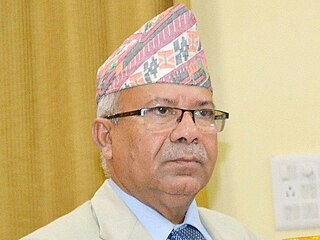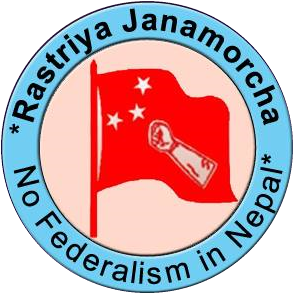
The Communist Party of Nepal , abbreviated CPN , CPN-Maoist Centre, CPN Maoist Centre, or CPN (MC), is the third largest political party in Nepal. It was founded in 1994 after breaking away from the Communist Party of Nepal. The party launched an armed struggle in 1996 against the Nepalese government. In 2006, the party formally joined mainstream politics after signing a peace agreement following the 2006 Nepalese revolution.

The Communist Party of Nepal is a communist political party in Nepal. The party emerged as a major party in Nepal after the end of the Panchayat era.

The Communist Party of Nepal , abbreviated CPN (UC–M) was an underground communist party in Nepal. The CPN (UC–M) was formed in 2002 through the merger of Communist Party of Nepal and Communist Party of Nepal (Masal).

The Communist Party of Nepal was a communist party in Nepal. CPN (UC) was formed on 19–20 November 1990 through the merger of Communist Party of Nepal (Mashal), Communist Party of Nepal, Proletarian Workers Organisation, and Communist Party of Nepal (Janamukhi). Soon thereafter, a group led by Baburam Bhattarai and Shital Kumar, who had left Communist Party of Nepal (Masal), joined the party. Samyukta Janamorcha Nepal was set up as the open mass front of the party.

The Communist Party of Nepal was a communist party in Nepal 1974–1990. It was the major communist group in Nepal during the latter part of the 1970s, but gradually lost influence due to internal disputes. The party actively participated in the struggle for democracy in 1990, and its leader took part in writing the Nepalese Constitution. It later merged with other forces to form the Communist Party of Nepal, out of which the Communist Party of Nepal emerged.

The Communist Party of Nepal (Mashal) was an underground communist party in Nepal. CPN (Mashal) was formed in November 1984, following a split in the Communist Party of Nepal (Masal). The new party was founded at a congress in Gorakhpur, India. It was difficult to identify any major ideological difference between the two factions, and probably the split was caused by dissatisfaction with Singh's authoritarian leadership methods. Mohan Baidya became general secretary of the new party. Other Central Committee members elected at the Gorakhpur conference were Chitra Bahadur K.C., Ramsingh Shris, Bhairav Regmi, Govindsingh Thapa, Pushpa Kamal Dahal, Khambasingh Kubar, Bachaspati Devkota, C.P. Gajurel, Dev Gurung, Ishwari Dahal, Bishnu Pokhrel and Bhakta Bahadur Shrestha.

The Communist Party of Nepal (Marxist–Leninist) was a political party in Nepal. It was launched in 1978 by the All Nepal Communist Revolutionary Coordination Committee (Marxist–Leninist), which founded by groups involved in the Jhapa movement. The CPN (ML) published Varg-Sangarsh and Mukti Morcha.

The Communist Party of Nepal (Marxist–Leninist) is a communist political party in Nepal. It was formed by Chandra Prakash Mainali when the Communist Party of Nepal (Marxist–Leninist) reunified with Communist Party of Nepal. Mainali had refused to go along with the merger and led a faction of the former Communist Party of Nepal (Marxist–Leninist) to reorganize the party.

Madhav Kumar Nepal, is a Nepalese politician and former Prime Minister of Nepal. He served as Prime Minister of Nepal from 25 May 2009 to 6 February 2011 for nearly two years.

Mohan Bikram Singh, often referred to as MBS, party name Gharti, is a Nepalese communist politician. His father was a wealthy landlord in Pyuthan District who was close to King Tribhuvan. MBS however joined the opposition Nepali Congress in 1950, and took part in the 1950–1951 uprising for democracy.
Communist Party of Nepal (Unified) was a communist party in Nepal. The party was formed in 2007 through the merger of three groups:

Communist Party of Nepal (Masal), initially known as Communist Party of Nepal , is an underground communist party in Nepal, which emerged in 2006 through a split in Communist Party of Nepal. In March 2007, the party held a 7th Party Congress. The congress reelected Mohan Bikram Singh as general secretary. Moreover, the congress removed 'Unity Centre' from the party name.

The Nepal Communist Party, abbreviated NCP is a defunct communist party of Nepal. It was founded on 17 May 2018, from the unification of two leftist parties, Communist Party of Nepal and Communist Party of Nepal. The unification was completed by the Party Unification Coordination Committee, after eight months of negotiation. The two predecessor parties subsequently dissolved, making way for the new united party. The party retained the electoral symbol of the CPN (UML), the sun.

Rastriya Janamorcha is a political party in Nepal. It was originally founded in 1995 as the legal front of Communist Party of Nepal (Masal). Former Deputy Prime Minister, Chitra Bahdur KC is the chairman of the party.

The United People's Front of Nepal, abbreviated SJM, was the front of the Communist Party of Nepal, or CPN (UC).
Rishi Kattel is the leader of one of the communist parties in Nepal. He is currently the Chairman of Communist Party of Nepal, which was formed in 2013 along with other communist leaders Lok Narayan Subedi, Jagat Bogati, Sharan Bikram Malla, Ram Bahadur Bhandari and Bhim Sedhai. He is the former chairman of Communist Party of Nepal (Unified).
The Revolutionary Internationalist Movement (RIM) was an international communist organization founded in France in March 1984 by 17 various Maoist organisations around the world. It sought to "struggle for the formation of a Communist International of a new type, based on Marxism–Leninism–Maoism". The RIM appears to be defunct as are many of the founding organisations and many changed their names over the years, or have dropped active armed struggle.

The Unified Communist Party of Nepal , abbreviated UCPN (Maoist),, was a political party in Nepal. It was founded in 2009 after merging with minor Communist parties including the Janamorcha Nepal. On May 19, 2016, it merged with ten other breakaway factions and minor parties to form Communist Party of Nepal.

Communism in Nepal traces its roots back to the pro-democracy movement of 1951, and the subsequent overthrow of the autocratic Rana regime and the establishment of democracy in Nepal. The communist movement in Nepal has split into factions multiple times and multiple factions have come together into a single fold at times as well. It has a history of getting banned from open political discourse, as well as multiple instances of embracing guerrilla insurgency, most notably, the Maoist insurgency in the 1990s and early 2000s that led to the Nepalese Civil War, claiming at least 17,000 lives.









